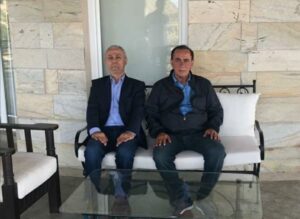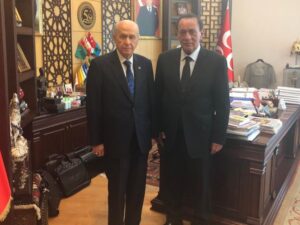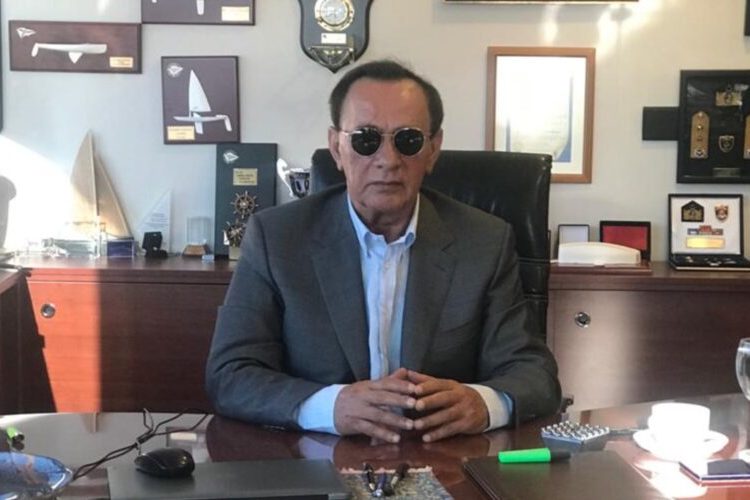Abdullah Bozkurt/Stockholm
Alaattin Çakıcı, Turkey’s most notorious mafia leader who was convicted and served time on multiple charges from organized crime to drug trafficking, has now become part of the de facto coalition government in Turkey run by a trio of Islamists, far-right elements and neo-nationalists.
The mob boss, after his recent release from prison thanks to a government amnesty, has been trying to improve his public profile, commenting on a range of domestic and foreign policy issues and openly threatening critics of the government. Çakıcı’s background in the far right Grey Wolves (Bozkurtlar or Ülkü Ocakları, as they are known in Turkish) and his secret missions overseas suggest Erdoğan and his allies want to put a known crime machine at work running an intimidation campaign both at home and abroad.
Çakıcı, now 67, had worked with Turkey’s National Intelligence Organization (MIT) since 1987 in running clandestine operations both in Turkey and abroad before he was detained in France. He served a six-month sentence in Nice before being extradited to Turkey in December 1999 and is now back at the center of politics. He was involved in carrying out unsolved murders on behalf of dark forces nested in the security and intelligence branches of the government.
As the rule of law has effectively been suspended in Turkey in recent years, the Islamist government of President Recep Tayyip Erdoğan and its nationalist partners have turned to mafia groups to run the country, intimidate opponents and sustain a climate of fear. Since his release from prison on April 16, 2020 by an amnesty secured by the Nationalist Movement Party (MHP) and endorsed by Erdoğan, Çakıcı has been busy in consolidating various mafia groups on behalf of the government and issuing threats to opposition politicians.
Alaattin Çakıcı threatened Turkey’s main opposition Republican People’s Party (CHP) leader Kemal Kılıçdaroğlu in a four-page letter:
On November 17, 2020, Çakıcı threatened Turkey’s main opposition Republican People’s Party (CHP) leader Kemal Kılıçdaroğlu in a handwritten statement released on Twitter. Insulting the politician as an “ignorant informant who serves traitors like a dog,” the mafia leader vowed to punish Kılıçdaroğlu with impalement. He defended MHP chairman Devlet Bahçeli as his respected elder and took offense at Kılıçdaroğlu’s criticism of the MHP leader.
“Look Dürzü [a slang word used as an insult in Turkish, meaning scoundrel or pimp], you described Mr. Bahçeli as the guardian of the [Erdoğan] palace. The [presidential] complex which you called a palace is the highest office of our state. Fully supporting the [Turkish] state is a way of life for Mr. Bahçeli. if you used the concept of guardian in a different sense, if you put the traitors you serve like a dog in the same pot with Bahçeli, you are making the biggest mistake of your life. If you exceed your boundaries while I’m alive, I will introduce you to the bean stake [impale you],” Çakıcı wrote in his four-page letter.
He described jailed former leader of the pro-Kurdish Peoples’ Democratic Party (HDP) Selahattin Demirtas and jailed philanthropist Osman Kavala in his letter as traitors and accused Kılıçdaroğlu of defending them in the name of freedom of expression. Erdoğan remained silent in the face of the open physical threats to the main opposition leader, while Bahçeli defended Çakıcı as a comrade and said he and the mob leader believed in the same cause. Since then, Çakıcı has leveled new threats against Kılıçdaroğlu.

“I would like to remind this man called Macron [the French president] — the husband of an older woman who wants to stir up the Mediterranean Sea with the guidance of an older woman and who suffers from an erosion of his personality — that we buried you in deep waters in Canakkale [during World War I]. You got out in a hurry when you came to the southern part [of Turkey after World War I]”, he wrote on September 17, 2020. In early November, the French government banned the activities in France of Turkish ultranationalist group the Grey Wolves.
Çakıcı’s threatening letter against France and Greece over the east Mediterranean:
In his letter Çakıcı also threatened the existence of Greece. Similar statements were issued on Libya, Nagorno-Karabakh, Cyprus, Iraq and Syria, where the Erdoğan government has been providing military assistance to factions aligned with Turkey. In June 2020 he met Mehmet Ali Ağca, the Turkish nationalist who attempted to assassinate Pope John Paul II in 1981. Ağca is also linked to the Grey Wolves.

Çakıcı has a long rap sheet. He was convicted of “leading an organized criminal gang” by an İstanbul court in 2007 and stood trial for having intimidated 40 businessmen into not submitting bids in the sale of Türk Ticaret Bankası (Türkbank) in 1998. He was convicted and sentenced to one year, three months in prison in May 2010. He had about a dozen other criminal cases launched against him and was held responsible for the deaths of 41 people. Çakıcı even had his ex-wife Nuriye Uğur Kılıç killed in January 1995 after she revealed some of the dirty dealings her former husband was involved in. Çakıcı openly threatened her before the murder, and the hired gun, Abdurrahman Keskin, admitted in a statement that he committed the murder on orders from the mafia boss.
When he was interrogated in Nice by Belgian investigators after his detention in France in August 1998, he admitted being involved in smuggling massive quantities of heroin into Europe with Turkish drug lord Selim Işık, also known as Selim the Fox. Işık was captured in January 2010 in Istanbul and charged with running a network trafficking heroin and illicit drugs from Iran, Pakistan and Afghanistan to Europe, particularly the Netherlands.
He worked closely with Yavuz Ataç, a former MİT official who was responsible for the organization’s external operations. Ataç brought Çakıcı to intelligence headquarters after the Istanbul MIT directorate vouched for him and verified his credentials as an asset. He started protecting Çakıcı and even provided him with a diplomatic passport to help him flee Turkey when the mafia leader faced imminent imprisonment.

In a 2011 statement to a prosecutor who was investigating the extrajudicial killings of the 1990s, Ataç admitted that Çakıcı had participated in some MİT operations, benefited from the organization’s resources and was trained to carry out to his duties. Another intelligence officer, Kaşif Kozinoğlu, worked with Çakıcı at the operational level. Kozinoğlu was exposed when he was caught by the police in several wiretapped phone conversations with Çakıcı as he was trying to help the mafia boss flee Turkey. Kozinoğlu was convicted in March 2010 along with several others for helping in the escape of Çakıcı, who himself was sentenced to four years, seven months in the same trial.
Çakıcı lost his main backer, the MHP, when the far-right party lost the elections of 2002 to Erdoğan’s Justice and Development Party (AKP), which later provided political support to the police and judiciary to crack down on mafia groups during the AKP’s first and second terms in government. According to a report by the police anti-smuggling and organized crime department, a total of 28,172 people had been detained during the course of 2,954 operations carried out against organized crime networks by 2010. Many key figures were convicted and sent to prison.

In the aftermath of corruption investigations that exposed Erdoğan and his family members in December 2013, Erdoğan turned to the mafia and the MHP for support. Hundreds of police chiefs have been removed from key positions since January 2014 and replaced with nationalist figures who had records of doing business with the mafia. Erdoğan and his allies needed a public face to consolidate disparate mafia groups and tapped Sedat Peker, a convicted leader of an organized crime syndicate. When Peker did not perform well and failed to meet expectations, Erdoğan and the MHP turned to Çakıcı as the point man to run the underworld crime syndicates.
All the evidence indicates that the Erdoğan government and his far right allies are bent on using criminal syndicates to get things done by force and maintain the intimidation campaign while getting rich from commissions secured by the mafia from all sorts of criminal enterprises such as drug trafficking and bid rigging.












